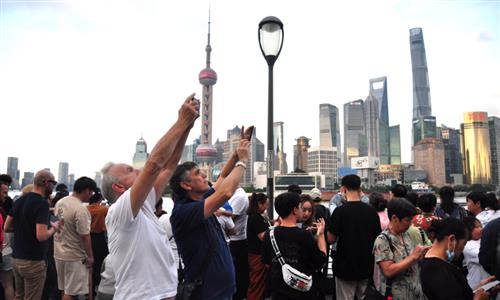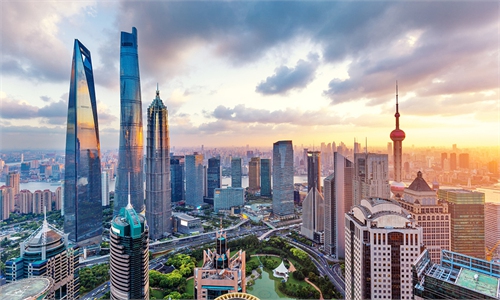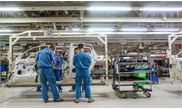
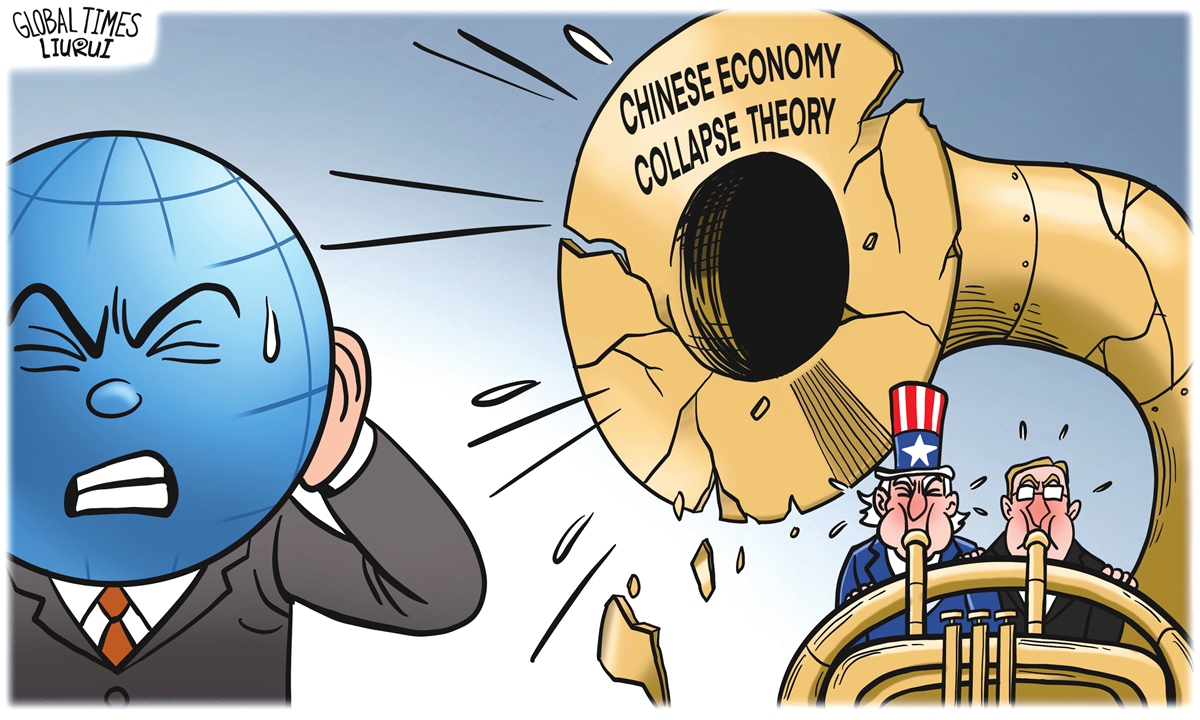
Senseless cacophony. Illustration: Liu Rui/GT
Editor's Note:
In a slew of recent Western media reports on China's economy, some are biased and distort the facts, failing to reflect the actual situation of its steady recovery despite multiple headwinds. As China's economy is steadily advancing its post-pandemic recovery and moving toward quality growth, it is important for global investors and trading partners to avoid misunderstandings caused by disinformation by the ill-intentioned doomsayers. To this end, the Global Times invites Chinese and foreign economists to opine on related issues to reflect the actual situation of China's economy.
Recently, the voices chanting "China's economy is in danger of Japanification" have become rampant throughout Western media outlets. Some reports claimed that China's economy is showing signs of falling into a "long-term recession" similar to Japan's in the 1990s following an asset price bubble burst. It is farcical for Western doomsayers to think that China is repeating Japan's missteps and sliding into the cycle of "Japanification."
If one must compare China's economy with Japan's, China's current economic situation is more like that of Japan in 1970s when Japan's economy was prosperous and achieving technological progresses on many fronts. It is rather misleading and distorting for Western media to exaggerate some superficial similarities between China's current economic situation and Japan's faltering economy in the 1990s.
In the 1970s, Japan's technological advancement was eye-catching. From electronics to cars, Japan had almost all the technology trees clicked correctly. Interestingly, the same thing is happening in China today. China now has domain experience across all cutting-edge technology. Chinese cars are now starting to sell well around the world. China is expected to replace Japan as the largest automobile exporter this year. China is also a world leader in many technological fields such as new energy and artificial intelligence.
How to correctly view the recent downward pressure on China's economy? Western slander has missed one thing: What China's economy is experiencing now is the growing pains amid transitioning from a stage of high-speed growth to a stage of high-quality development. The downward pressure is temporary. The fundamentals of the Chinese economy remain solid, which can fully support sustainable and quality growth.
The so-called "risks of China's real estate industry" have been blown out of proportion for quite a while by Western pessimists. But is China's real estate industry really "collapsing" as they claimed?
Admittedly, both the supply side and the demand side face near-term challenges. However, the current downward pressure on China's real estate sector is the result of the proactive regulation and adjustments. To tame the risks resulting from overheat and speculation moves in the sector at the time, related authorities have adopted strict rules, especially in terms of credit. This doesn't mean that there is a lack of demands in the market. It is completely different from Japan in the 1990s. When policy priorities shift, market sentiment in China's real estate sector will turn optimistic, and the industry will pick up accordingly.
The other point the foreign media has overly exaggerated is China's local debt, with some sensational headlines even calling out "China's growth is buried under great wall of debt."
In this regard, in the past, when the economy was about to recover, local governments were encouraged to increase credit. However, since this year, the local government borrowing has been tightened, so the investment demand of local governments is not as strong as before, which is also a very important reason why the demand is not as strong as expected.
In order to achieve long-term, sound and high-quality economic development, China has proactively made policy adjustments targeting these two aspects. As a result, economy faces some downward pressure to a certain extent, but it is obviously temporary and controllable. The foreign media are intent on amplifying this short-term downward trend into a long-term recession. For example, the New York Times wrote an article "How do we manage China's decline?" Such ill-intentioned word play is really pitiful.
How should we correctly view the potential of China's economy? In the next few years, China's potential growth rate is expected to be around 5.5 percent.
First, China still has relatively high saving rates - around 45 percent. The high saving rate will eventually be converted into either investment or technological progress, which will support economic growth. China is creating enormous wealth year after year. The large capital stock is great potential for the economy.
Second, China is already close to the forefront of world technology in many aspects. In some fields, China is completely dominant. In terms of medium-level technology, China has already been in the leading position. Admittedly, there are some individual areas, for example, Germany and Japan are still leading. But overall, China is now a technological power after the US. This is another great potential to support economic growth.
Third, China's per capita income level is still low, standing at only one-sixth of that in the US. Even in Japan in the 1990s, it was nearly 80 percent of the US. China's gap means potential, and China still has vast room to catch up.

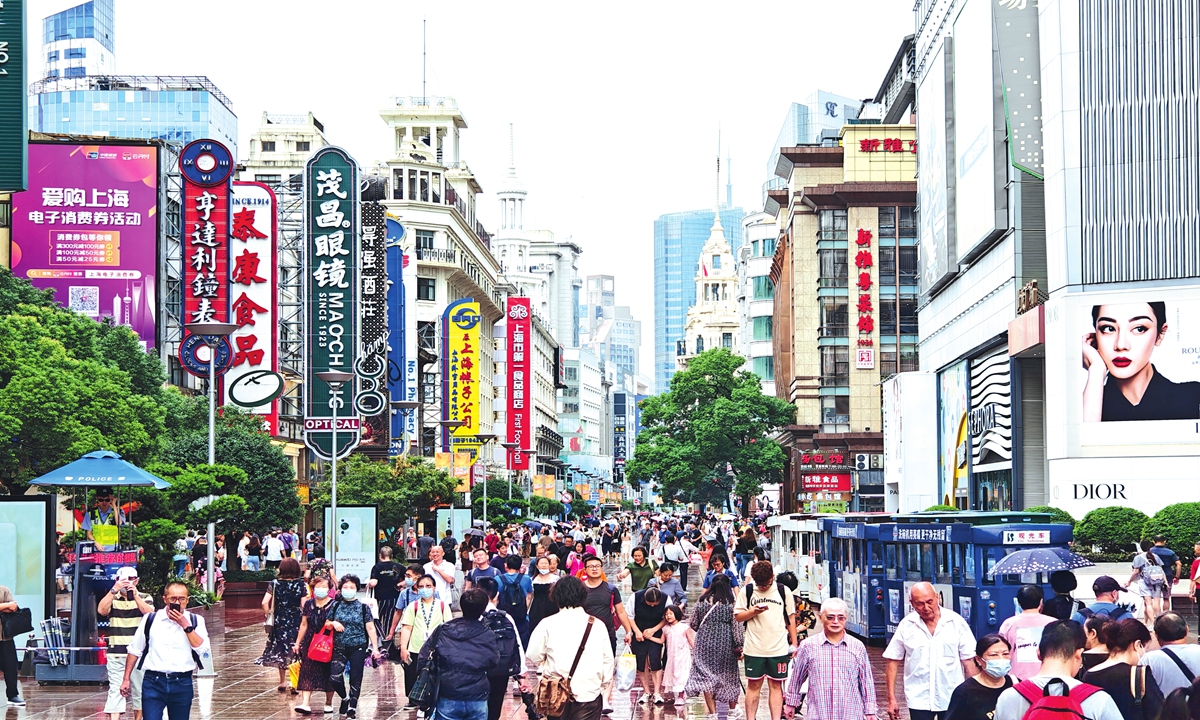
Bustling scenes on Nanjing Road, East China's Shanghai Municipality on September 14, 2023 Photo: VCG
Some foreign commentators have been nitpicking about China's economic growth in the first half of this year, claiming it has fallen short of expectations. But if one looks at GDP growth data, it actually exceeded expectations. Previous expectation put it at around 5 percent, but the actual growth was 5.4 percent in the first half of the year. The Western doomsayers are mainly targeting China's stock market and real estate market, and Bloomberg even coined the term "confidence trap" to slander China's economy.In my opinion, the second half of this year will be a process of bottoming out in both real estate and the stock market. It must be emphasized that the conclusions from the arguments in some Western media reports which exaggerate China's short-term downward pressure into a long-term decline are completely wrong.
In the real estate sector, there are reports that China's real estate sector has shown recent signs of recovery with the introduction of a series of optimization policies. In the past few days, many second-tier cities have introduced policies to cancel purchase and price restrictions, which is expected to generate a great boost on consumer confidence.
Hopefully, there will be following measures on the supply side. If the restrictions on credit are loosened, especially for these real estate companies, it will be easier to complete the guaranteed delivery of buildings. As the recovery trend is getting clear, at the very least, the sector is expected to reverse the negative growth and bottom out soon, which may happen at the end of the year.
China's economy has no structural problems. In fact, this is the best period in China's history in terms of technological innovation and progress.
China has almost clicked on all strategic areas of technology. China is also leading the world in the field of future technologies, such as photonic chips, quantum computing, quantum communications, and nuclear fusion. These are probably the technologies and revolutions of the future. China will definitely not lag behind in terms of advanced technology, and it is even possible for China to take a lead. Therefore, the US' suppression of China's technology has been counterproductive, which is to promote China's technological progress.
Therefore, there is no problem in the pioneering area of technological innovation in China's economy. China enjoys strong industrial capability. In the next ten to twenty years, no country can possibly replace China's position in the global industrial chain.
On an industrial basis, China accounts for more than 30 percent of the world's manufacturing industry. China's new-energy vehicles have shined this Munich Auto Show. This shows the solid foundation of China's industry. If China's strength in these sectors keeps accumulating, it will be China's turn. The pathetic slander targeting China's economy will be proved to be nothing but nonsense and sour grapes pushed by those with a bad faith agenda.
The author is Dean of the National School of Development, Peking University. bizopinion@globaltimes.com.cn
